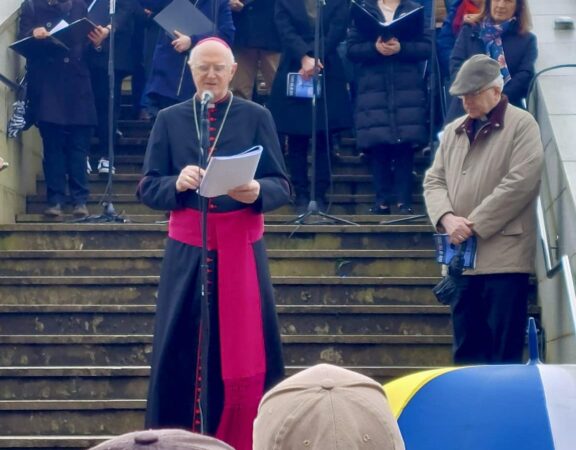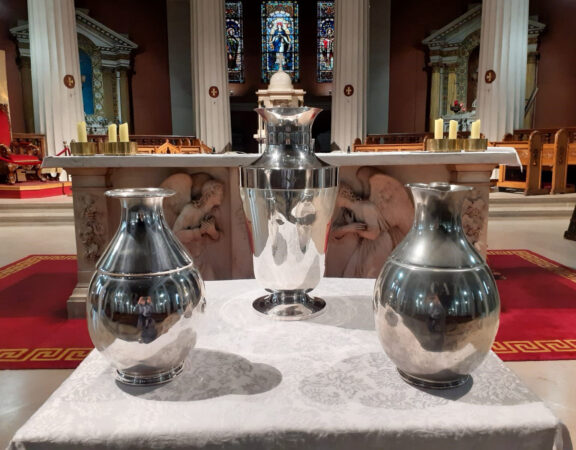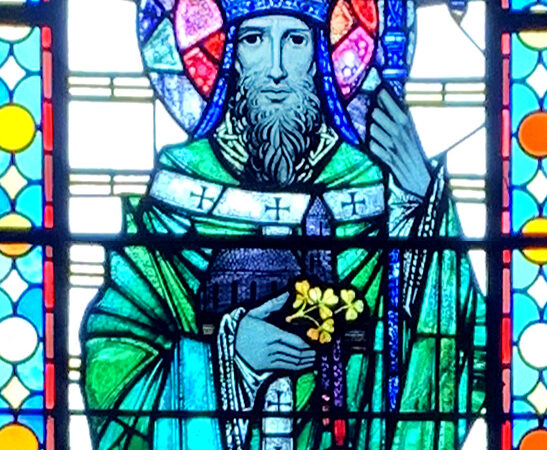14th November 2007
Naomh Lorcan O’Tuathail lived in a time of great change, change which was, arguably, more turbulent than our own and just as profound. His initial vocation was to become a monk at Glendalough, following in the footsteps of Naomh Caoimhin. Glendalough was under the patronage of his clan, his family, so he became its abbot at the comparatively young age of 25. In 1162 he left the monastic life to become Archbishop of Dublin, having already refused the Bishopric of Glendalough. It was a time of great political upheaval and of very rapid changes of power and alliances, involving his own family, the O’Tooles, the Kavanaghs, and the Southern, Northern and Western Irish kings, vying with one another for overall leadership, as they had always done but now having to take account also of the Ostment or Vikings and the most recently arrived Normans. Naomh Lorcan became Archbishop of Dublin , it is said, by common consent. The appointment was strongly political, one who was acceptable to all sides
It was also a time of rapid change in the Church, as the Irish Church moved from being a Church of monks and monasteries to being a Church of Bishops, diocese and parishes, a development not always in the interests of a ruling family like his own. In these circumstances and in such times, Naomh Lorcan, responded to the call of God to shepherd to his people.
He was a devoted pastor, putting his people’s interests before everything else and doing so at some considerable cost to himself. Because he did so he travelled on a mission of peace and reconciliation to King Henry II, and on that mission he died, and was buried abroad, in Eu, in Normandy.
He would not be the last. Today, at this Mass the Dublin Book of Honour, which records the names of those who died in the great war, from 1914 – 1918 and who, like Naomh Lorcan, are buried abroad, will be presented. It will be presented in the presence of those who compiled it to the pilgrims who have travelled from Eu, to celebrate the Feast of Naomh Lorcan with us today, who have the remains of Naomh Lorcan and of some of the dead of the great war buried in their parish.
In her book, ‘Borning the Future – Passion for Life’, Sr. Joan Chittester, O.S.B. writes: “It is not easy to be born in one era and then find yourself with responsibility for the borning of one completely other than the one you have known.” That was where Naomh Lorcan found himself. It is where we, as Dubliners find ourselves today, especially those who are followers of Jesus, who are the Church of Dublin.
Rooted in prayer and in the service of his people, especially, the poor, grounded also in his family, at home in his own place and in the traditions of his people, Naomh Lorcan had the perspective from which he could navigate his way through the rubble of his times and lead the way into a new future. People committed to the past and to the future, as Joan Chittester says “are rare breeds….bridge builders as well as visionaries, rocks of stability in a sea of change…..hinges of the generations”. They are those in whom the prophecy of Ezeckiel in the first reading of our Mass, is fulfilled. “I am going to take you from the nations and gather you together from foreign countries and bring you home.” People like that are good shepherds to their generation. It is what we as the Church of Dublin, today, are called to be.
The Book of Honour being presented at this Mass, also honours the past and honours those who received little honour among their own people and in their own time. The special collection at our Masses this Sunday, for Catholic Youth Care, the Diocesan Agency which shepherds young people, honours the future.
To stand in that place has its price. It costs. It cost Naomh Lorcan. The cost is the cost of discipleship, disciples of Jesus, the master, the good shepherd who lays down his life for his sheep. To stand with Naomh Lorcan “under the long crossed shadow of God showing how to die” (Hilary Davies, In a Valley of this Restless Mind, p.23), will cost us, too. It is a position of helplessness. We are not in charge of events or of our lives. It is also a place of hope. Like the one who laid down his life for his sheep, we are in the hands God.
If Naomh Lorcan stood under the long shadow of the cross, he stood at the place of ‘cross over’. So do we. Like him, we are called by the Good Shepherd to be leaders of our people into the new future, in which the Lord pours clean water over us, cleansing us of our defilement and idols, giving us a new heart and putting a new spirit in us. For those who do and for those for whom it is done, the prophecy of Ezekiel will be fulfilled, “ You shall be my people and I will be your God.”









